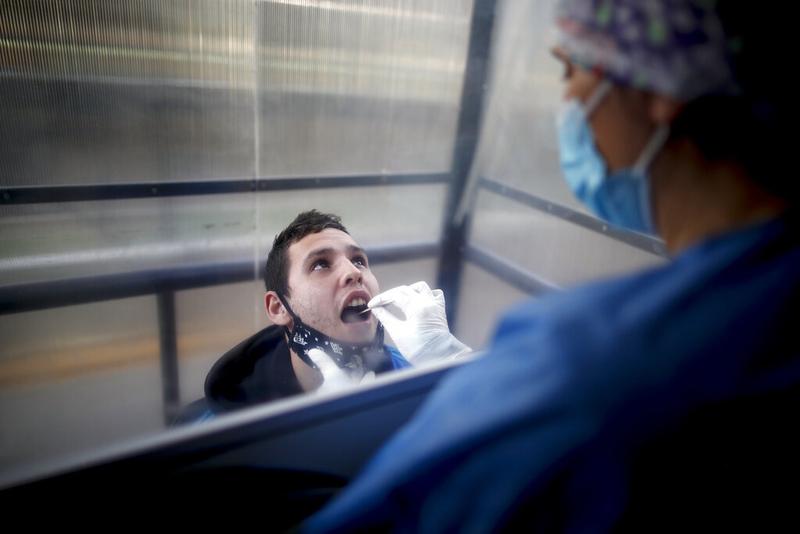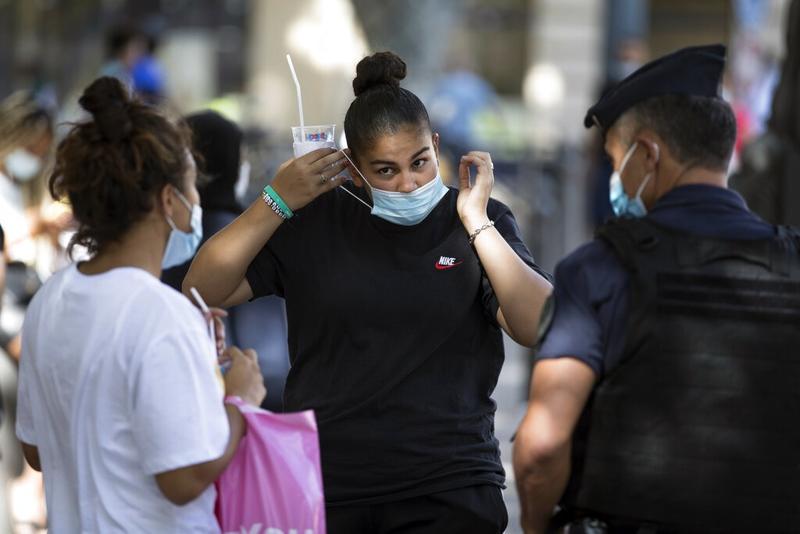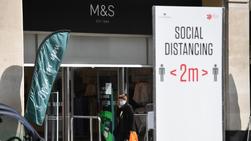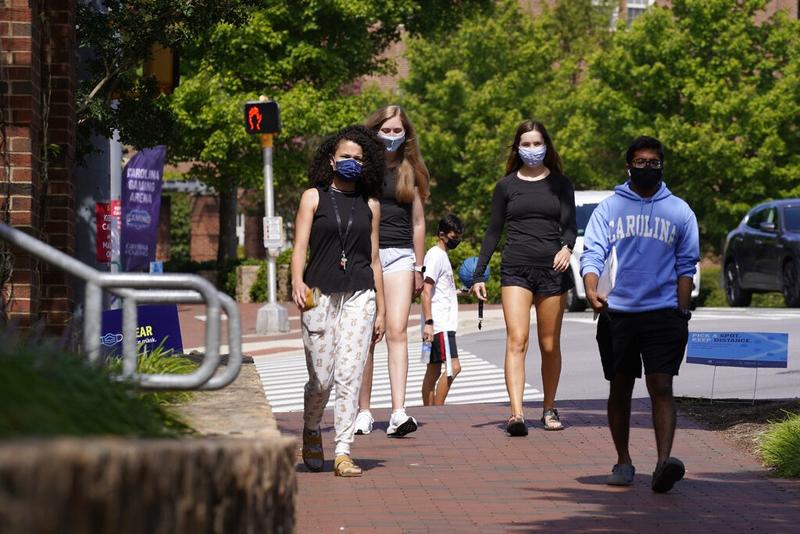 Pope Francis delivers his blessing as he recites the Angelus noon prayer from the window of his studio overlooking St.Peter's Square, at the Vatican, Aug 16, 2020. (ANDREW MEDICHINI / AP)
Pope Francis delivers his blessing as he recites the Angelus noon prayer from the window of his studio overlooking St.Peter's Square, at the Vatican, Aug 16, 2020. (ANDREW MEDICHINI / AP)
NEW YORK / BUENOS AIRES / BERLIN / RIO DE JANEIRO / DUBLIN / HARARE / PARIS / LONDON / MONTREAL / MOSCOW / TBILISI - Rich countries should not hoard a coronavirus vaccine and should only give pandemic-related bailouts to companies committed to protecting the environment, helping the most needy and the ‘common good’, Pope Francis said on Wednesday.
“It would be sad if the rich are given priority for the COVID-19 vaccine. It would be sad if the vaccine becomes property of this or that nation, if it is not universal and for everyone,” Francis said at his weekly general audience.
The World Health Organization (WHO) said on Tuesday that any nation which hoards possible COVID-19 vaccines while excluding others would deepen the pandemic.
WHO chief Tedros Adhanom Ghebreyesus, who has warned against “vaccine nationalism”, urged countries to join a global pact by an Aug. 31 deadline to share vaccine hopefuls with developing countries.
More than 150 vaccines are in development, about two dozen are in human studies and a handful are in late-stage trials.
Francis also said it would be a “scandal” if governments doled out pandemic-related bail-out money to only select industries.
He said the criteria for companies to receive public aid should be if they “contribute to the inclusion of people who are normally excluded (from society), to helping the most needy, to the common good and to caring for the environment”.
ALSO READ: WHO: 'Supply nationalism' worsens COVID-19 pandemic
 Passengers arriving at Rome's Ciampino airport wait to be tested for COVID-19 on Aug 18, 2020. (CECILIA FABIANO / LAPRESSE VIA AP)
Passengers arriving at Rome's Ciampino airport wait to be tested for COVID-19 on Aug 18, 2020. (CECILIA FABIANO / LAPRESSE VIA AP)
Global tally
Global COVID-19 cases surpassed 22 million on Tuesday, with the US, Brazil and India accounting for more than half the total, according to the Center for Systems Science and Engineering (CSSE) at Johns Hopkins University.
The global tally reached 22,046,135 as of 8:27 pm local time (0027 GMT Wednesday), according to the CSSE data.
Fatalities recorded across the world topped 779,000, according to the data.
The United States is the worst-hit nation in this pandemic, with more than 5,48 million cases and over 171,000 fatalities, followed by Brazil, with nearly 3,36 million cases and almost 110,000 deaths. India confirmed more than 2.7 million cases.
Besides the US and Brazil, countries with more than 400,000 cases also include Russia, South Africa, Peru, Mexico and Colombia. Other countries with over 30,000 deaths include Mexico, India, Britain, Italy and France, according to the center.
READ MORE: WHO: 'Supply nationalism' worsens COVID-19 pandemic
Africa tally
The number of confirmed COVID-19 cases in Africa has risen to 1,128,245 while the death toll reached 25,884, the Africa Centers for Disease Control and Prevention (Africa CDC) said on Tuesday.
Total recoveries recorded across the continent stood at 846,330, the Africa CDC said.
Albania
Schools in Albania will reopen in mid-September while respecting health protocols against the spread of COVID-19 disease, Minister of Education, Sports and Youth Besa Shahini said on Tuesday.
The minister urged municipalities across the country to start preparing for the new school year, such as cleaning the school premises and equipping schools with the necessary sanitization tools.
The announcement came as health authorities reported 155 new coronavirus cases, bringing the total number of confirmed cases in the country to 7,654, with 3,871 recoveries and 232 fatalities.
Argentina
Argentina confirmed 6,840 new cases of the coronavirus and 172 additional deaths on Tuesday, taking it simultaneously over the 300,000 case and 6,000 death threshold as the Latin nation battles a surge of contagions in recent weeks.
The country's health ministry reported a total of 305,966 cases and 6,048 fatalities.
Dr Luis Camera, a member of the Argentine government's health advisory group, said that while cases, intensive care admissions and hospital bed occupancy rates were not still climbing, they had settled at an unsustainable level.
"The highest points for the City of Buenos Aires could have been the last days of July and the first days of August," he told Reuters TV. "Now the infection curve has stabilized at a plateau, but a high plateau. In South America, you call it the altiplano, as opposed to the lowlands."
 A health worker takes a swab sample from a person with symptoms for a COVID-19 test at a hospital in Buenos Aires, Argentina, Aug 18, 2020. (NATACHA PISARENKO / AP)
A health worker takes a swab sample from a person with symptoms for a COVID-19 test at a hospital in Buenos Aires, Argentina, Aug 18, 2020. (NATACHA PISARENKO / AP)
Austria
Austria is expanding its travel warning for the Spanish mainland to include the Balearic islands, such as Mallorca and Ibiza, because of an increase in coronavirus infections there, Chancellor Sebastian Kurz said on Tuesday.
The travel warning for the popular tourist region will take effect on Monday, meaning that people arriving in Austria from that day will have to present a negative coronavirus test or else go into quarantine until they are tested.
Brazil
Brazil reported 47,784 new cases of the novel coronavirus and 1,352 deaths from the disease caused by the virus in the past 24 hours, the health ministry said on Tuesday.
Brazil has now registered 3,407,354 cases of the virus while the official death toll from COVID-19 has risen to 109,888, according to ministry data.
One in five workers at Brazil’s meat plants have been infected with the virus, according to union estimates. That would make the country home to one of the world’s worst workplace outbreaks.
The estimate comes from Nelson Morelli, the president of national workers union Contac-CUT who spoke Tuesday on a webinar. The figure would mean about 100,000 infected workers in the country’s meatpacking industry, which employees half a million people. To be clear, it’s not an official count and is based on surveys with the group’s local members. But an outbreak even close to that figure would be one of the biggest globally for a single industry, outside of health care.
Canada
The Canadian province of Quebec on Tuesday announced plans to tackle earlier mistakes in fighting the COVID-19 pandemic, while preparing its health sector against a possible second wave of coronavirus in the autumn.
Quebec, once the country’s hardest-hit province for COVID-19, will boost public health sector hiring, reduce screening delays, and ensure staff like orderlies can no longer work at multiple long-term care facilities, a practice previously blamed for spreading the virus, Health Minister Christian Dubé told reporters.
Quebec accounts for about half of Canada’s 122,872 total coronavirus cases and more than half of its 9,032 deaths. But the once hard-hit province only reported 46 new cases and two deaths in the last 24 hours, according to government data.
There will no longer be movement of workers, other than nurses under certain conditions, between seniors’ homes, where most of the province’s 5,727 COVID-19 deaths took place.
Under the plan, Quebec will also invest C$106 million (US$80.58 million) in public health to allow for the hiring of 1,000 workers to do contact tracing and infection control.
 A worker monitors the body temperatures of shoppers via a thermal camera during the reopening of the Costanera shopping center, in Santiago, Chile, Aug 18, 2020. (ESTEBAN FELIX / AP)
A worker monitors the body temperatures of shoppers via a thermal camera during the reopening of the Costanera shopping center, in Santiago, Chile, Aug 18, 2020. (ESTEBAN FELIX / AP)
Chile
Chile's Ministry of Health on Tuesday reported that the number of confirmed COVID-19 cases in the country has risen to 388,855 and the death toll reached 10,546.
According to the ministry, 1,336 new cases and 33 more fatalities were registered in the past 24 hours.
A total of 362,440 people have recovered from the disease while 15,869 cases are considered to be still active.
Ecuador
Ecuador registered 1,190 new cases of COVID-19 in the past 24 hours, taking the total caseload to 102,941, the Ministry of Public Health said on Tuesday.
The official death toll stands at 6,105, though there were another 3,581 deaths recorded in the past five months that are suspected of being COVID-19 related, but have not been verified.
The north-central province of Pichincha, where the capital Quito is located, is the current epicenter of the national outbreak, with 20,986 cases, including 18,945 in Quito.
Egypt
Egypt reported 163 new COVID-19 cases and 11 more deaths on Tuesday, raising the total infections in the country to 96,753 and the death toll to 5,184, said the Egyptian Health Ministry.
Another 911 coronavirus patients were discharged from hospitals, taking the total recoveries to 61,562, said the ministry's spokesman Khaled Megahed.
Finland
Finland's Prime Minister Sanna Marin said on Wednesday her COVID-19 test taken a day earlier was negative, but she would continue to work remotely due to respiratory symptoms.
Meanwhile, Finland said it will bring back travel restrictions for several countries which it had for months considered safe destinations, including Germany and its Nordic neighbours, to stop the spread of COVID-19.
Travelling from Iceland, Greece, Malta, Germany, Norway, Denmark, Ireland, Cyprus, San Marino and Japan to Finland will be limited to essential trips starting Aug 24, with people returning from those countries required to self-quarantine for two weeks, Minister of Interior Maria Ohisalo said.
Prior to Wednesday's announcement, Finland had already restricted travelling to and from most other countries around the globe.
Finland has reported a total of 7,776 cases and 334 deaths, after seeing 24 new cases and one death on Tuesday.
Harakka said 43 cases had been detected on travellers arriving on three different Wizz Air flights from Skopje in North Macedonia to Turku in Finland recently and authorities were looking into ways of cancelling the connection.
France
The French health ministry reported 2,238 newly confirmed coronavirus infections on Tuesday, less than recent daily highs but still at levels last seen during the March-May lockdown imposed to stem the spread of the disease.
The number of people in hospital fell again by 102 to a new low of 4,823 and the number of people in intensive care slipped by four to 380, reflecting a preponderance of younger people among new cases who are more likely to be asymptomatic or not to fall seriously ill.
The number of people in ICU is now back at levels seen at the end July, after having fallen as low as 367 last week.
The death toll increased by 22 to 30,451, following an increase of 19 on Monday and just 1 on Sunday.
 A resident puts on a face mask after a French riot police officer informed her of the mandatory face mask requirement in Marseille, southern France, Aug 18, 2020. (DANIEL COLE / AP)
A resident puts on a face mask after a French riot police officer informed her of the mandatory face mask requirement in Marseille, southern France, Aug 18, 2020. (DANIEL COLE / AP)
Germany
New COVID-19 infections in Germany increased by 1,510 within one day, the highest daily figure in over three months, the Robert Koch Institute (RKI) announced on Wednesday.
The last time the figure was higher was on May 1, with 1,639 new daily infections, according to the federal government agency for disease control and prevention.
Daily infections in Germany had peaked at around 6,000 in early April. Numbers started falling in May but have been rising again since the end of July.
The country now has a total of 226,914 confirmed cases.
The head of Germany's vaccines regulator said some groups of people living in Germany could be vaccinated early next year against the coronavirus.
Klaus Cichutek, head of the Paul Ehrlich Institut, told the Funke group of newspapers that data from Phase I and Phase II trials showed some vaccines triggered an immune response against the coronavirus.
"If data from Phase III trials shows the vaccines are effective and safe, the first vaccines could be approved at the beginning of the year, possibly with conditions attached," he said.
"Based on assurances from manufacturers, the first doses for people in Germany will be available at that time, in accordance with the priorities set by the Standing Committee on Vaccination," Cichutek said, referring to the group that makes recommendations for the use of licensed vaccines in Germany.
The RKI said 39 percent of cases were probably imported, with Kosovo, Turkey and Croatia most often reported as the likely source of infection in recent weeks.
German biotechnology firm CureVac has not ruled out a speedy approval process for its prospective vaccine and expects to have it on the market by mid-2021.
Greece
Greece will extend restrictions in the popular holiday island of Mykonos and the coastal area of Chalkidiki in northern Greece to contain the spread of COVID-19 infections, Civil Protection authorities said on Wednesday.
The measures include a complete ban on live parties and festivities, a limit of nine people in all public and private gatherings and compulsory mask wearing in closed and open spaces.
No more than four people can be seated at the same table in restaurants unless they are very close relatives, in which case the limit is increased to six people.
The restrictions will go into effect from August 21 to 31.
On Tuesday Greece recorded 269 COVID-19 infections, its highest daily tally since its first case was detected on Feb 26.
Based on the latest data up to Tuesday, Greece has recorded a total of 7,472 COVID-19 infections and 232 deaths.
Georgia
Georgia confirmed 10 new COVID-19 cases on Wednesday, bringing its total to 1,361.
Two of the 10 new cases was imported, the National Center for Disease Control and Public Health (NCDC) said.
As of Wednesday, 1,098 of the country's 1,361 patients have recovered, while 17 others have died, the center said.
Ireland
Ireland significantly tightened its nationwide coronavirus restrictions on Tuesday to try to rein in a surge in cases, urging everyone to restrict visitors to their homes, avoid public transport and older people to limit their contacts.
Martin said the new measures would stay in place until at least Sept 13.
As well as cutting to six the number of visitors allowed in a home - where most clusters have occurred - outdoor gatherings are being restricted to 15 people from 200, with all fans banned from sport. Police will get greater powers to enforce the rules.
The 190 new cases on Tuesday, the second highest daily rise since early May, took the rate of growth in the last two weeks to the fourth highest in Europe and meant infections would inevitably spread to the most vulnerable if it continued, Prime Minister Micheal Martin said.
At the end of July, O’Brien Fine Foods discovered one coronavirus case among its workers. Within a week, the Irish company was dealing with 80 cases.
O’Brien’s, whose clients include Tesco Plc, suspended production at its plant in Kildare, west of Dublin. Three nearby food producers have done the same, and on Tuesday, Glanbia Plc reported four positive cases in the same area.
In the capital, a video emerged of a barman standing on a counter to pour shots into customers’ mouths at a brunch event, a scene PM Martin described as “appalling”.
Meanwhile, Ireland will reopen schools for the first time since March, Martin said.
Kenya
Kenya's Ministry of Health announced on Tuesday it was shifting COVID-19 testing to hotspots and groups considered at higher risk of contracting the disease.
Rashid Aman, chief administrative secretary in the Ministry of Health, said that the decision to shift to targeted testing was taken due to widespread community transmission in the country.
Aman said that coronavirus transmission dynamics were changing rapidly as previous hotspots record minimal cases and new clusters emerge in rural counties.
The announcement came as Kenya's infection tally rose to 30,636 on Tuesday after 271 more people tested positive for COVID-19.
According to Aman, recoveries rose by 208 to 17,368 while the death toll increased by fivev to 487.
Libya
The National Center for Disease Control of Libya on Tuesday reported 407 new COVID-19 cases, bringing the total number of confirmed cases to 8,579.
The center said in a statement that the total number of recoveries rose by 36 to 969 while the death toll increased by four to 157.
Mexico
Mexico's health ministry reported on Tuesday 5,506 newly confirmed cases of coronavirus infections and 751 additional fatalities, bringing the total in the country to 531,239 cases and 57,774 deaths.
The pandemic is now in "sustained decline" in Mexico after a significant drop in fatalities during the past week, the government's coronavirus czar Hugo Lopez-Gatell said earlier in the day.
In the week through Aug 17, the health ministry recorded 4,020 additional fatalities from the virus, a decline of almost 20 percent from the previous seven-day period.
As recently as Aug 1, Mexico for the first time registered over 9,000 new cases in a single day. The country has the third highest coronavirus death toll globally, and posted one of its biggest daily tallies earlier this month.
Still, Deputy Health Minister Lopez-Gatell said that in most of Mexico, the number of new daily cases and deaths has been diminishing.
Separately, the Mexican government on Tuesday announced it would receive a donation of 100,000 polymerase chain reaction (PCR) coronavirus tests from Germany as it hosted a delegation of medical experts from Europe's largest economy in Mexico City.
Morocco
Morocco on Tuesday reported 1,245 new COVID-19 cases, taking the total number of infections in the country to 44,803.
Recoveries increased by 1,061 to 31,002 while the death toll rose by 33 to 714, said Mouad Mrabet, coordinator of the Moroccan Center for Public Health Operations at the Ministry of Health, in a press briefing.
Netherlands
Amsterdam increased supervision of bars and restaurants to make sure they adhere to COVID-19 guidelines as the number of new cases is on the rise, said Mayor Femke Halsema.
Bars and restaurants can face fines and a forced closing of up to four weeks.
If new infections continue to rise, the Dutch capital will also consider an early closing time for bars and restaurants, a mandatory face mask across the city and a prohibition on gatherings of more than 30 people, she said.
READ MORE: Europe clamps down on nightlife to regain grip on COVID spread
Poland
Poland's Health Minister Lukasz Szumowski said on Tuesday he was resigning from his post, the second resignation in two days from the ministry, which has faced growing criticism for its handling of the coronavirus crisis.
Szumowski has denied any wrongdoing.
The announcement came a day after Deputy Health Minister Janusz Cieszynski announced he was leaving the ministry.
Poland has seen a spike in coronavirus cases in recent weeks, driven in part by outbreaks among coal miners.
The country of 38 million has reported a total of 57,876 coronavirus cases and 1,896 deaths.
Russia
Russia reported 4,828 new coronavirus cases on Wednesday, pushing its nationwide tally to 937,321, the fourth largest in the world.
Russia's coronavirus taskforce said 117 people had died over the last 24 hours, bringing its official death toll to 15,989.
Slovenia
Slovenia urged its citizens to return from Croatia by the end of the week or face an obligatory two-week quarantine after the number of COVID-19 cases continued to rise there, the government spokesman said on Tuesday.
“The situation is so bad that we have no choice but to urge citizens to return from the dangerous country as soon as possible,” Jelko Kacin said.
Slovenian vacationers already in neighbouring Croatia will be able to return until the end of this week, while those travelling to Croatia from Aug 21 onward will have to go into obligatory quarantine, he said.
South Africa
South African authorities are investigating government departments for graft over irregularities in coronavirus-related tenders worth 5 billion rand (US$290 million), the head of its Special Investigating Unit (SIU) told lawmakers on Wednesday.
The figure is likely to add to pressure on President Cyril Ramaphosa and the ruling African National Congress, who have struggled to deflect criticism from alliance partners and opposition parties as allegations of corruption implicated senior ANC politicians.
Ramaphosa, who replaced his scandal-prone predecessor Jacob Zuma in 2017 with promises to eradicate corruption, has battled to root out criminality linked to the fight against COVID-19 in South Africa, which has the world’s fifth highest number of coronavirus infections at 592,144.
In a presentation to a parliamentary committee, Andy Mothibi, head of the SIU, which investigates allegations against public sector figures or institutions, said it was working on 658 cases nationwide involving just over 5 billion rand - the first time a number has been put on the alleged graft.
Sweden
A newborn infant who tested positive for COVID-19 was likely infected in the mother's womb, Swedish medical journal Dagens Medicin reported Tuesday, making it the first known case in Sweden where a baby had been infected at birth.
The newborn is now being treated at the Skane University Hospital, in the southern Swedish city Malmo, where the head of pediatric surgery and neonatal care Elisabeth Olhager told Dagens Medicin that the baby was likely infected during the pregnancy.
The mother was confirmed to be infected before giving birth, Dagens Medicin reported, but the infant displayed none of the symptoms typical in small children with COVID-19, such as cough, fever or fatigue.
It is a rare case as globally, there had been just a few reported instances of babies being infected with COVID-19 during pregnancy. A British study published in medical journal Lancet Child & Adolescent Health in July followed 116 pregnant women with confirmed COVID-19 and none transmitted the disease to the child during pregnancy, according to the Swedish Television report.
The Gambia
The Gambian health ministry reported a record 244 new COVID-19 infections on Tuesday, taking the country's infection tally to 2,116.
Another 14 people were discharged from treatment centers, bringing the number of recoveries to 415, the ministry said.
The death toll remained at 63, the ministry said.
Tunisia
Tunisia on Tuesday reported 129 new COVID-19 cases, bringing the total number of confirmed cases in the country to 2,314.
Since Tunisia reopened borders to tourists on June 27, a total of 1,112 confirmed cases had been reported across the country, including 441 imported cases and 671 local cases, as well as seven deaths, the Ministry of Health said in a statement.
Meanwhile, the country has recorded a total of 1,370 recoveries and 57 deaths, according to the statement.
 A shopper wearing a face mask as a precaution against the spread of the novel coronavirus walks past a branch of the clothing and food retailer Marks and Spencer in central London on Aug 18, 2020. (JUSTIN TALLIS / AFP)
A shopper wearing a face mask as a precaution against the spread of the novel coronavirus walks past a branch of the clothing and food retailer Marks and Spencer in central London on Aug 18, 2020. (JUSTIN TALLIS / AFP)
UK
Britain plans to bring in regular, population-wide testing for COVID-19 so it can suppress the spread of the virus and limit restrictions that have crippled one of the worst hit countries in the world.
Health Secretary Matt Hancock said the government was trialing a range of new, faster tests that can give instant results and hoped to roll them out towards the end of the year.
The government said it would expand a testing study from 28,000 people now to 150,000 by October and ultimately to 400,000
The government said on Wednesday it would expand a testing study being run by the Office for National Statistics from 28,000 people now to 150,000 by October and ultimately to 400,000 to help establish a better national picture of the pandemic and spot local outbreaks. Hancock said the survey would help plug the gap in their knowledge of finding which people had the virus but were asymptomatic.
Meanwhile, Hancock said that Britain is unlikely to follow France in ordering people to wear face coverings at work because its test and trace scheme shows most people catch COVID-19 in house-to-house transmission.
ALSO READ: 2m UK jobs seen going after furlough scheme ends
He also said that Britain was working with London's Heathrow Airport on a plan to use COVID-19 testing to help shorten the number of days that travellers have to spend in quarantine when they arrive from certain countries.
Scottish First Minister Nicola Sturgeon said it was not yet safe to lift additional COVID-19 restrictions in Aberdeen following an outbreak there, but that the situation in the city was improving.
The UK recorded 1,089 new cases on Tuesday, up from 713 on Monday and pushing the tally to 320,286, government figures showed. A further 12 people died after testing positive for the coronavirus within 28 days.
Ukraine
Ukraine registered 1,967 new coronavirus cases in the past 24 hours, officials said on Wednesday, a new daily record for infections in the country.
The data given by the national council of security and defense surpassed the previous single-day record of 1,847, reported last week.
Total cases now stand at 96,403, with 2,144 deaths.
 Students wear masks on campus at the University of North Carolina in Chapel Hill, North Carolina, Aug 18, 2020. (GERRY BROOME / AP)
Students wear masks on campus at the University of North Carolina in Chapel Hill, North Carolina, Aug 18, 2020. (GERRY BROOME / AP)
US
The University of Notre Dame on Tuesday suspended in-person classes and moved them online for at least two weeks after seeing a surge in coronavirus cases, the latest university to roll back campus reopenings.
The Indiana school, with almost 12,000 students, said 147 people have tested positive since Aug 3. Many were seniors who lived off campus and spread the virus at gatherings, according to the university’s website.
Separately, Michigan State University told most students to stay home and learn remotely, a week before move-in was set to begin.
READ MORE: College students come to grips with learning choices
Schools in parts of the country that have a coronavirus infection positivity rate of more than 10 percent would be better off easing into the new academic year with virtual classrooms, Anthony Fauci, the top US infectious diseases expert, said on Tuesday.
Fauci said primary and secondary schools as a default position should try and reopen for the psychological health of children, but no single approach should apply to every school in the country.
The US has reported more than 5.48 million confirmed infections and over 171,000 deaths, according to a tally by Johns Hopkins University.
Zambia
Zambia's confirmed COVID-19 cases have continued rising, with the total number nearing the 10,000 mark.
According to the latest figures released by the health ministry on Tuesday, the country has reported a total of 9,981 cases after 142 new cases were registered in the last 24 hours.
The death toll remained at 264 while recoveries rose by 201 to 8,776, according to the data.
Zimbabwe
Zimbabwe's Ministry of Health and Child Care on Wednesday morning reported 70 new cases of COVID-19, pushing the country's tally to 5,378.
The death toll stood at 141, after six more coronavirus-related deaths were reported on Tuesday, all of which were posted in the capital Harare.
Another 257 recoveries were also reported, taking the total number of recoveries to 4,105. The number of active cases stood at 1,132.
The government on Tuesday shortened an overnight curfew and extended business hours despite rising cases.
The curfew, which started last month and ran from 6 pm to 6 am, will now start from 8 pm and end at 6 am.
Business operating hours will be extended to 4.30 pm from 3 pm, and citizens that test negative upon return to the country are no longer required to be quarantined.


